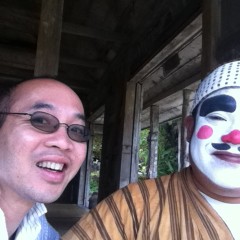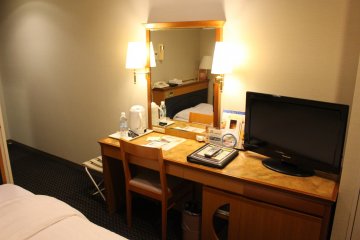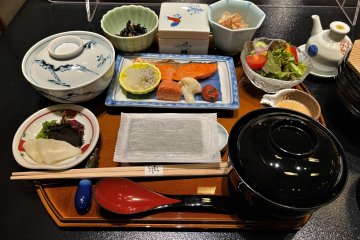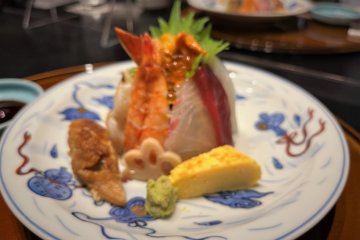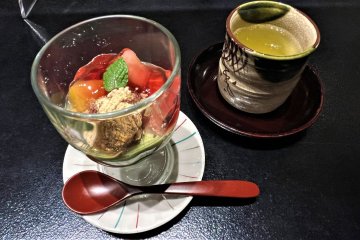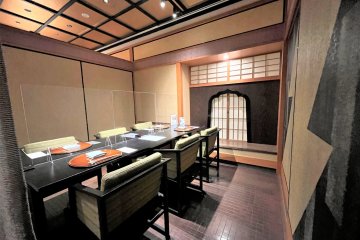Once the home to merchants and warlords, Osaka is now known as the kitchen of Japan. What better place to take in its culinary heritage, than at Uemachi restaurant, one that pays tribute to the cultural plateau with the same name.
Sense of Delight
It is said that we first eat with our eyes, and the starter served in three round closhes was amusing. Resembling Temari, a handcrafted ball used in children’s games or kimono ornaments, it evokes a sense of loyalty and friendship, as these are treasured items made by mothers with a secret wish for their children’s happiness for New Year.
Be delighted by the unveiling of the first closh, to a delightful amuse bouche of Chrysanthemum leaves with tofu lees. It reminds me of the sounds of the Nutcracker suite, a delight to experience, filled with surprise and floating like air.
The second closh was lifted to reveal a pairing of spinach and clam, symbolic of Osaka’s ties with the land and the sea
The third closh unveiled pickled persimmon and daikon radish, a testament to the skill of local artisans, its tang preparing you for the main courses of assorted sushi or wagyu beef, side dishes, and dessert in this miniature Kaiseki menu.

Sense of Place
Uemachi is a place of calm with a theme of elegance and gentleness, evoking the splendor of Momoyama culture with its miniature bamboo gardens and tea house rooms, Japanese paper screens, and kimono-dressed staff.
Situated in the Sheraton Miyako Hotel, it has those warm rosewood tones, spacious lobbies, and grand rooms to impress the in-laws or the company clients on your wedding day. In a kaiseki course, the order of the meals is always the same, for hundreds of years. In what other cuisines can you say this? It is easy to imagine what it would be like to dine here with the tea ceremony master Sen no Rikyu.

The calm and well-thought-out interactions with staff, along with the meaningful silences in a near-private dining room atmosphere provides space for poetic contemplation, this is a genuine Zen-like retreat in this chaotic yet fun city. The contrast with the disco party throngs in Dotonbori could not be greater.
The service may lack the drive of the owner-run restaurants in Sakaemachi but if you want professional service that lets you keep to yourself, then a hotel restaurant like this is the way to go for a meal where you lose track of time.
Sense of Land
What is in a name? The name Uemachi may not mean much to the uninitiated, however, an examination of old maps from the 5th century shows this restaurant on top of a sandbank, which became the Uemachi plateau, dividing Osaka into Higashinari (東成) or “East-becoming” and Nishinari (西成) or "West-becoming".
Looking beyond Higashinari is a food bowl ascending to the Asuka no Tanda and the Shimoakasaka Terraced Paddy Fields, where they plant rice in spring when the flooded fields mirror the sky in its beauty. Farmers have lived here for generations in this Satoyama of rich produce, with hand-cut buckwheat soba, Asuka ruby strawberries, and Yuzu Miso, blended with hearty chunks of this highly aromatic fruit and zest, singing with a floral tang to the umami of miso, delivered to the kitchens of Uemachi Restaurant.
On the other side, Nishinari takes you to the port of Sakai and the riverside warehouses at Nakanoshima. These grand waterways land fresh fish from the inland sea, and historically, treasures of all kinds from the Angkor and Ayutthaya Kingdoms. It is even said the word kabocha or pumpkin comes from the name Cambodia, in the time when Portuguese merchants plied the maritime silk route.
It is only natural that the highest point of Uemachi Plateau is Osaka Castle, but from the 15th floor of the Sheraton Hotel, you can see the castle below you in the distance. Imagine the Daimyo at the top of the castle, looking over the rice fields to the east or the fishing boats to the west, while having a kaiseki like you are having today.


